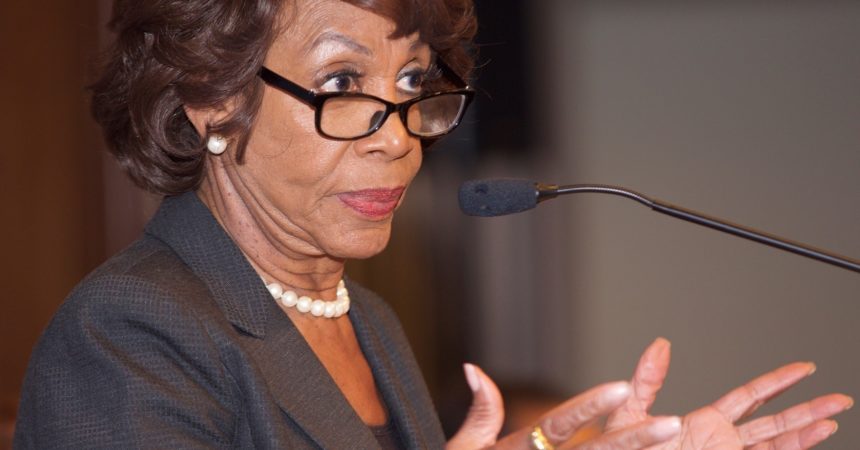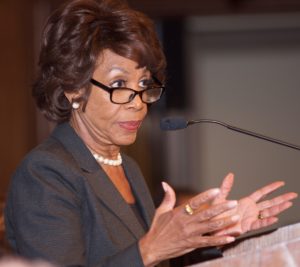
National Black Political Convention aims to set Black agenda
April 16-18 gathering expected to draw Democratic presidential candidates, national policy makers, activists

Congresswoman Maxine Waters plans to attend the National Black Political
Convention in April.
Photo special to the Outlook
By Brianna Nargiso
Trice Edney Wire.com
As political observers continue to track America’s high valued Black vote to see which Democratic Presidential candidate may win the lion’s share this election year, the National Policy Alliance will host the National Black Political Convention at the Washington Plaza Hotel in Washington, D.C. April 16-18, 2020 to create a universal Black agenda.
“Voices sharing what we need to be focused on, planning and getting an agenda that is actually pertinent to our future.” This is how convention planner Linda Haithcox Taylor describes the convention, expected to draw members of Congress, speakers and political activists from around the country.
Presidential candidates Sen. Elizabeth Warren, Mayor Michael Bloomberg and Vice Pres. Joe Biden have all confirmed their attendance. Confirmed speakers include Sen. Cory Booker, Sen. Kamala Harris, Congressman Anthony Brown, Congresswoman Maxine Waters, Doug Williams and more than 30 others. Pres. Barack Obama has also been invited to speak about what Black people should be doing during this election period and throughout the next eight years.
The convention will serve as a political caucus for both Black voters, government officials and community organizers as Black leaders reconcile some of the most compelling issues and concerns that are heavily impacting the Black community. The status of healthcare, economic and environmental justice, affordable housing, education, criminal justice, Black veteran’s affairs, energy, media relations and the role of the Black entertainment industry are among those crucial issues.
On April 16, two weeks before the Maryland primary, The National Black Political Convention will kickoff its weekend of events with a presidential forum at Bowie State University in Baltimore. Bowie is significant because not only is it the oldest historically Black university in Maryland, but in 2017 the university also welcomed its first female president, Dr. Anita Breaux.
The goal is to spend the weekend creating a united Black agenda to be sent to both the Democratic National Committee and the Rupublican National Committee. Issues will be discussed through a series of speaker-led sessions. Sessions can also expect to be diverse in generation, offering representation for both older and younger voters.
Conveners for the convention include National Blacks in Government, National Association for Equal Opportunity in Higher Education, National Black Agenda, and the Futures Forum among others.
Attendants can register for the National Black Political Convention by going to the website of the National Policy Alliance: https://npalinks.org/nbpc/
The first National Black Political Convention in 1972 served as the first major gathering of Black voters and political thinkers in Gary, Indiana united to discuss the pressing social and economic issues of the time. These issues included minimum wage discrepencies, home rule for Washington, D.C, the elimination of capital punishment and more.
Thousands of African-American intellectuals, community organizers and voters were present alongside representatives from 46 states. Notable attendees were then presidential candidate Shirley Chisolm, volunteer sergeant at arms Muhammad Ali, Black Panther Party co-founder Bobby Seale, Mrs. Coretta Scott King, the Rev. Jesse Jackson Sr., Min. Louis Farrakan, civil rights icon Dick Gregory among others.
From this convention came several united principles pursued by Black civil rights organizations, religious leaders, local, state and national officials. Convention participants convened to discuss the creation of a Black agenda to be given to political parties.
Echoing the legacy of the 1972 convention, 44 years later, in 2016 another convention was hosted, this time by the National Policy Alliance. Missioned as an organization that “brings together public officials, community leaders, aspiring public servants, and the citizens they serve,” the National Policy Alliance organized what would be the second National Black Political Conference marking the end of Pres. Barack Obama’s term as president. The agenda of issues included but was not limited to education, gun control, healthcare, voting rights and economic opportunities for African-Americans.
Since the first convention in 1972, the number of Black members of Congress has more than tripled, significantly increasing Black representation in government. However, many challenges remain and can expect to be redressed and brainstormed for applicable solutions.
Taylor says the National Policy Alliance wants the room full of people dedicated to the Black agenda, ready to propose solutions and share experiences contributable to the cause of the convention. She concludes, “This is not and has never been a meeting about complaining, it’s a meeting about solutions.”







